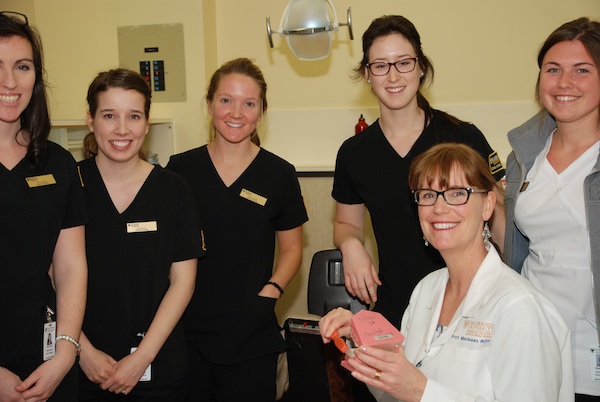News
» Go to news mainNursing students brush up on oral health care
 Nursing students learn about oral health care for patients in long-term care.
Nursing students learn about oral health care for patients in long-term care.
When nursing lecturer Deborah Hartlen called Peggy Maillet, assistant professor in the School of Dental Hygiene, to ask about borrowing some oral health care teaching kits, Maillet suggested a different approach: Why don’t the nursing students come over to the Dentistry Building and learn from dental hygiene instructors in the clinic?
And that was how 46 nursing students in the first year of the accelerated (two-year) program found themselves in Aisle A South on the morning of April 25, learning how to floss properly and gamely brushing each other’s teeth.
The students who participated in the session were getting ready to go out on their long-term care placements, so after a lecture on oral health care, the detailed training focused on teaching how to brush the teeth of those who could not do it for themselves, such as those who have had a stroke or have difficulties with mobility, and those affected by dementia. The nursing students also learned how to remove and care for dentures and partials, particularly for those undergoing cancer therapy.
Oral health care is normally taught as part of the nursing program, usually in larger groups of students in a lab setting. The students who participated in the oral hygiene session appreciated the opportunity to work in small groups in the clinic and to try out what they learned on each other.
“It was great to learn the techniques from someone who has this expertise and who deals with oral health care every day,” says nursing student Shelby Clattenburg.
Oral health care for those with restricted mobility and dementia
“I’m glad to have this training,” says Samantha Chaulk, another student. “We’re about to start our long-term care placements, so we will be looking after people with Alzheimer’s and dementia and those who have had strokes with limited mobility.”
Clinical instructor Anna Ordinelli says that she also learned a lot from the session. Ordinelli and the other nursing instructors were there to observe, but one of the aims of the session is to boost the knowledge and skills they are able to pass on to students.
Peggy Maillet, who went on to teach a similar oral hygiene session at the Collaborative Health Education Building (CHEB) for lab instructors and first-year nursing students in the four-year program on May 3, 2016 , says that by the year 2038, 3% of Canadians will have dementia. “If patients don’t get good oral health care when they are in long-term care facilities, it disrupts their ability to eat and sleep. Their whole body is affected,” she says.
Brenda MacIsaac, one of the dental hygiene professors instructing the nursing students, demonstrated good brushing and flossing techniques and talked about the importance of tooth care in hospital and long-term care settings. “The ability to eat is vital to patients’ health,” she says, “and dental diseases can spread to the heart and other organs. It’s important that you be educated to know that oral health care is important and to care enough to do it.”
The School of Dental Hygiene is continuing to explore new ways of collaborating with the Faculty of Health Professions.
Recent News
- Start planning for DentDays 2024
- Climb every mountain: Dr. Kevin Walsh enjoys a challenge
- The 2023 QEII Foundation Diversity in Health Care Bursaries: Part of this community
- A whole new ball game in the Faculty of Dentistry
- A donation with great impact
- DentDays dates announced
- 2024 JD McLean Lecture: An interview with Bob Hope
- Finding a silver lining in a snowstorm
